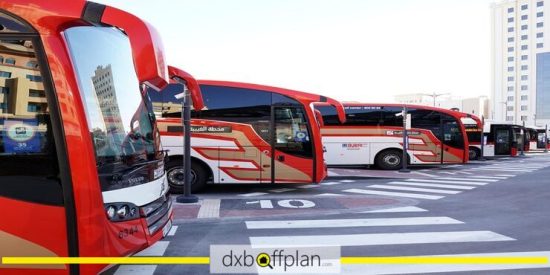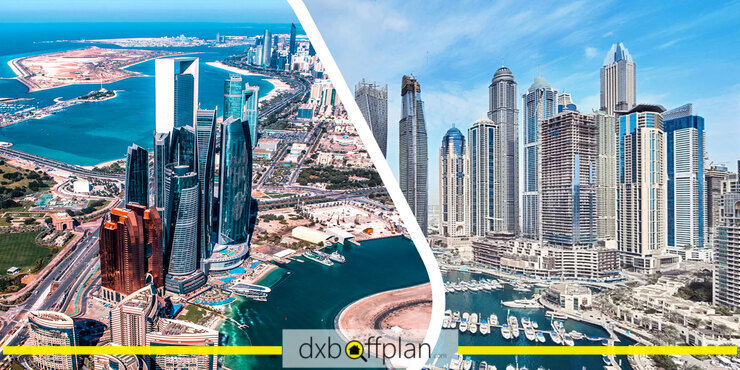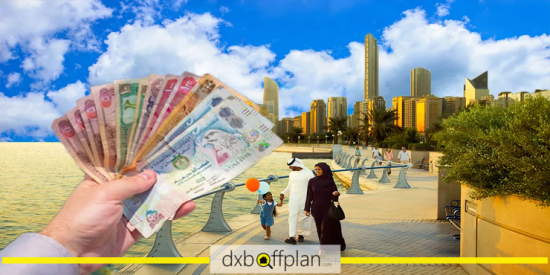Abu Dhabi Cost of Living: Complete Guide and Budgeting Tips
Abu Dhabi represents the Arab dream accomplished. It is the country’s political and administrative capital. It is also a recognised financial and cultural hub of the Gulf. But in Abu Dhabi, living is not cheap. Knowing the prices is required for any one who wants to settle or move to the city.
In this Dxboffplan article, we take a close look at Abu Dhabi’s cost of living, from accommodation and food to transport and entertainment. We also provide some advice on how to budget in this luxury city.
An overview of Abu Dhabi’s cost of living index
Abu Dhabi, the capital and one of the most developed cities in the United Arab Emirates, provides a blend of opulent living and cutting-edge amenities. Typically, housing rent, food costs, transportation, healthcare, and education all have an impact on the city’s cost of living index. Abu Dhabi is comparatively more expensive than many other Middle Eastern cities, but its excellent standard of living, security, and cutting-edge infrastructure more than make up for these costs. Additionally, many expatriates are able to enjoy a high standard of living in the city due to the availability of well-paying job opportunities for professionals and foreign employees.
In contrast to the Global Cost of Living Index
Abu Dhabi’s cost of living index is higher than the global average, but still lower than that of places like New York, London or Zurich, according to the most recent international statistics. Although luxury services and housing rent in Abu Dhabi can be costly, the lack or low rate of value-added tax makes many consumer goods and public services reasonably priced. Because of this, living in Abu Dhabi is still appealing and affordable when compared to the most expensive cities in the world, especially for those who earn high salaries or foreign currency.
Abu Dhabi’s Place in the List of Pricey or Inexpensive Cities
Abu Dhabi typically ranks among the 50 most expensive cities in the world, according to recent reports from organizations that measure cost of living, though this ranking can change based on changes in exchange rates and the state of the world economy. However, a lot of experts think that in some areas, like housing rent and entertainment expenses, Abu Dhabi is marginally less expensive than Dubai. Because of this distinction, Abu Dhabi is now a well-liked option for individuals and families looking for a good standard of living at an affordable price. The city has a unique position because of its reputation as a reasonably priced destination in the Gulf, as well as its safety and plenty of employment options.
Abu Dhabi Cost of Living: Accommodation, Food, and Transportation and more
In the Pros and Cons of living in Abu Dhabi we have explained about the tempting range of advantages you could expect when choosing the town for your permanent residence. Nevertheless, you cannot ignore Abu Dhabi cost of living which is a major element to consider for habitation. Here, we will go further into the accommodation, food, and transportation costs:
Cost of Housing in Abu Dhabi
One of the most expensive things people pay for in Abu Dhabi is for housing. The property prices in Abu Dhabi are rather expensive, whether you want to rent or buy a house, especially in the city center and upscale areas of the city. It’s expensive in terms of a lot of dirhams monthly. Here’s a closer look at apartments and villas prices in 2026:
| Property Type | Average Purchase Price (per m²) | Average Rent (per month) |
| Apartment | AED 10,979 – 17,000 | AED 5,600 – 11,500 |
| Villa | AED 8,400 – 12,100 | AED 20,000 – 22,000 |
Though housing may be expensive, the city offers first-class facilities and welfare services to its residents.
Abu Dhabi Cost of Groceries
Both big supermarkets and local markets offer various quality foods at varying prices. However, foreign goods can lead to higher costs. Here a closer look:
| Item | Average Price (AED) | Price Range (AED) |
| Milk (1 liter) | 7.31 | 4.45 – 12.50 |
| Bread (1 loaf) | 4.90 | — |
| Chicken (1 kg) | 23.70 | — |
| Eggs (12 pcs) | 9.60 | — |
| White Rice (1 kg) | 6.00 | — |
Based on this information, individuals who are going to migrate or live in this city should accordingly make arrangements to be in a position to afford these services. While it’s very expensive to live here, Abu Dhabi offers quality services and a high standard of living that have their own attraction.
Transportation Costs in Abu Dhabi
Abu Dhabi transport varies from ride-sharing and personal vehicles to bus and taxi services. Public transport is quite affordable, but most residents use private vehicles. Here’s a closer look:
| Transport Type | Fare Type | Price (AED) | Notes |
| Public Transport (Bus) | Single Fare | 2 | Fixed fare for most local routes |
| Weekly Pass | 30 | Unlimited rides for 7 days | |
| Monthly Pass | 80 | Best for regular commuters | |
| Taxi | Metered Fare | Varies by distance | Higher during peak hours and longer trips |
These costs, as well as other living costs, can be a significant burden on one’s individual budgets.
Abu Dhabi Recreation and Entertainment Expenses
Leisure and entertainment activities in Abu Dhabi are endless with its luxury shopping malls, international restaurants, and other entertainment complexes. The cost of such leisure activity would, however, comparatively be high. Here is a more detailed look:
| Attraction / Activity | Type | Cost | Location |
| Meal at popular restaurant | Dining | AED 100 – 300+ | Various (city-wide) |
| Louvre Abu Dhabi | Museum / Gallery | AED 63 (adults) | Saadiyat Island |
| Sheikh Zayed Mosque | Religious Landmark | Free | Airport Road area |
| Yas Waterworld | Water Park | AED 270 (adults) | Yas Island |
| Ferrari World Abu Dhabi | Theme Park | AED 345 (adults) | Yas Island |
| Qasr Al Watan (Presidential Palace) | Cultural Landmark | AED 60 (adults) | Ras Al Akhdar |
| Desert Safari | Outdoor Adventure | AED 150 – 300+ | Outskirts of the city |
| Emirates Park Zoo | Family Attraction | AED 40+ | Al Bahia |
| Corniche Beach | Public Beach | Free – AED 10 | Corniche Road |
| Observation Deck at 300 | Scenic Viewpoint | AED 95 (incl. voucher) | Etihad Towers |
| Mangrove Kayaking Tour | Eco-Adventure | AED 160 – 200+ | Eastern Mangroves |
| Warner Bros. World | Theme Park | AED 345 (adults) | Yas Island |
Costs of Education in Abu Dhabi
Abu Dhabi has high-quality education, but the costs are high as well. High-quality international schools could be expensive for parents.
The fees vary depending on the study program as well as the school or university level, but they go from a few to tens of thousands of dirhams annually. For instance, a University of Abu Dhabi full program fee is $11,780.
Typical Utilities Costs in Abu Dhabi
It is a huge mistake to look past the Utilities costs in Abu Dhabi. They might count for a large sum at the end of the month:
| Utility | Average Monthly Cost (AED) | Notes |
| Electricity & Water | 350 – 600 | Depends on usage and property size |
| Internet (100 Mbps) | 300 – 400 | Fiber-optic connections widely available |
| Mobile Phone Plan | 100 – 200 | Varies by data and call package |
| Gas (cooking/heating) | Often included in rent | Usually covered by landlord in apartments |
| TV/Cable Subscription | 150 – 250 | Optional, depends on provider and package |
 Healthcare Costs in Abu Dhabi
Healthcare Costs in Abu Dhabi
In healthcare, Abu Dhabi has one of the most advanced healthcare systems in the world. The Abu Dhabi healthcare system is, however, costly. For example, medical treatment for sickness, injury, or surgery is very costly, though there are many types of medical insurance that can take care of the cost. They are individual health insurance, family health insurance, senior health insurance, and group/employee health insurance, each with terms and coverage.
The government of UAE has attempted to ease the cost burden on the locals, but the Healthcare Costs in Abu Dhabi still absorbs a large portion of household income.
Abu Dhabi Cost of Living: How It Stacks Up Against Other UAE Cities and the Gulf Region
We are now going to compare Abu Dhabi’s cost of living with that of other UAE cities and in the region. A comparison like this provides us with a better understanding of Abu Dhabi’s economic standing vis-a-vis other regions:
| City / Country | Average Rent (1BR City Center, AED/month) | Meal at Mid-range Restaurant (AED) | Notes |
| Abu Dhabi (UAE) | 5,600 | 70 – 120 | Slightly cheaper rent than Dubai; modern amenities |
| Dubai (UAE) | 7,500 | 80 – 150 | Highest rents in UAE; more expensive dining |
| Sharjah (UAE) | 3,500 | 50 – 90 | More affordable housing; quieter city |
| Riyadh (Saudi Arabia) | 2,500 | 40 – 70 | Lower rent and food costs; growing expat scene |
| Doha (Qatar) | 4,500 | 65 – 110 | High salaries offset cost of living |
| Manama (Bahrain) | 2,800 | 40 – 70 | Smaller expat community; affordable living |
| Kuwait City (Kuwait) | 3,800 | 50 – 90 | Moderate rent; oil wealth impacts prices |
The Best Abu Dhabi Neighborhoods Based on Living Expenses
There are numerous neighborhoods in Abu Dhabi, and they vary greatly in terms of lifestyle, amenities, and cost of living. Your lifestyle, family needs, and financial situation all play a big role in where you choose to live. With their abundance of parks and schools, some neighborhoods are ideal for families, while others are more upscale and serve those with greater incomes. When renting or purchasing a home, knowing the features of each neighborhood will help you make the best choice.
Family-Friendly Neighborhoods at Reasonable Prices
Some neighborhoods in Abu Dhabi provide great family-friendly amenities at a lower cost if you’re looking to live there with more affordable expenses:
- Mohammed Bin Zayed City: Ideal for big families, rents are less expensive here than in the city center.
- Mussafah: Very reasonable rental costs, perfect for workers and industrial sector employees.
- Khalifa City A & B: Large villas and apartments in Khalifa City A & B are less expensive than those in the center.
These neighborhoods still have good levels of shopping, transportation, and educational amenities despite being less expensive.
Luxurious Communities with Unique Features
Abu Dhabi provides a number of prestigious neighborhoods that are well-known throughout the world for their beauty and high caliber of services for those looking for an opulent lifestyle with upscale amenities:
- Saadiyat Island: Modern beachfront villas and apartments with private beaches and first-rate sports facilities can be found on Saadiyat Island.
- Yas Island: Yas Island is the perfect place for wealthy families and those who like high-end entertainment.
- Marina Village: Beautiful sea views and easy access to upscale malls and fine dining establishments can be found in Marina Village.
Although these neighborhoods are more expensive to buy or rent, they offer the most comfortable, safe, and convenient access to the greatest cultural and recreational facilities.
Abu Dhabi’s Average Income and Purchasing Power
Abu Dhabi, one of the main economic centers of the Middle East, provides a large number of employment options in a variety of industries. Because of the presence of industries like oil and gas, finance, tourism, and technology, the average income in this city is higher than in many other cities in the region. Abu Dhabi is a desirable place to work for many expatriates and foreign professionals due to its high income and low tax rates. High expenses for luxury services, housing, and education, however, can have a big effect on people’s purchasing power.
High-Demand Positions and Pay in 2026
Due to economic expansion and the construction of massive projects, some jobs in Abu Dhabi are in the greatest demand and pay the highest salaries in 2026. These jobs can be found in both established industries like construction and energy as well as more recent ones like technology and financial services. It’s interesting to note that a lot of these opportunities are comparable to high-paying positions in Dubai, as both cities are top at luring in foreign talent and providing attractive compensation packages.
| Job | Average Monthly Salary (AED) |
|---|---|
| Oil and Gas Engineer | 45,000 |
| Construction Project Manager | 35,000 |
| Specialist Doctor | 40,000 |
| IT Specialist (Cybersecurity) | 30,000 |
| Chief Financial Officer (CFO) | 50,000 |
| Airline Pilot | 38,000 |
The ratio of income to monthly expenses
The type of job and income level have a significant impact on the monthly income to expense ratio in Abu Dhabi. For instance, a worker with AED 20,000 a month who lives in a one-bedroom apartment in the city center spends roughly 30 to 40 percent of their income on rent. Other major expenses include entertainment, food and transportation. The monthly expense share is significantly lower in higher-paying positions like financial management or oil engineering, enabling larger savings or investments. Overall, even those with average incomes can live comfortably in Abu Dhabi with good expense management; however, even high earners may experience financial strain due to the high cost of living if careful financial planning is not done.
The Benefits of Residing in Abu Dhabi
It is hard to count every benefit of living in Abu Dhabi but you can’t ignore the modernity merged with tradition and a whole range of opportunities in terms of employment. It is also hard to look past the amazing safety and the low crime rate and the high quality of life you could experience being close to exceptional educational institutions and modern hospitals. This is also a great place to raise your family as there are many family parks and world class shopping options and a whole range of affordable to luxury restaurants to dine out. The economy here used to be all about oil but now it is expanding into tourism finance and all you could expect from technology. Needless to say, that creates many job opportunities for expats and those looking to live a high standard of life. As a resident you could expect tax exemption and modern infrastructure and great connectivity because of the highly advanced public transportation links. And let’s not forget about the major airports for those travel enthusiasts coming to Abu Dhabi to explore the world.
The financial benefits and drawbacks of residing in Abu Dhabi
From an economic standpoint, there are both benefits and drawbacks to living in Abu Dhabi. On the one hand, the city is a desirable place to work and invest due to its tax exemption, high wages in specialized jobs, and stable economy. On the other hand, families’ and immigrants’ budgets may be severely strained by the high expenses of housing, education and some services. Therefore, careful planning, wise housing selection, and effective cost control are key components of financial success in Abu Dhabi.
Economic and Tax Benefits
The exemption from income tax, which enables residents to receive their full salary without deductions, is one of the main draws of living in Abu Dhabi. Many professionals and business owners have chosen the city as their place of employment because of this perk, as well as the low value-added tax rate and minimal customs fees. Additionally, Abu Dhabi offers great job and business opportunities due to its stable economy, significant investments in oil, gas, tourism, and technology, as well as the presence of multinational corporations. The combination of high income and low taxes is a significant benefit for people looking to grow their capital or save more money.
Cost Issues for Novices
Despite Abu Dhabi’s many economic advantages, newcomers frequently have to pay high living expenses, especially for housing, education, and upscale services. Tuition for international schools can be high for families, and renting an apartment in a central location can consume a sizable amount of income. Additionally, because they are unfamiliar with reasonably priced options for entertainment, transportation, and shopping, newcomers may overspend during the first few months. Even those with high incomes may experience financial strain if they do not carefully plan their finances. Therefore, finding reasonably priced goods and services and comprehending the cost structure are essential to assisting newcomers in successfully managing their budgets.
Cost of Living in Abu Dhabi: Expensive yet Manageable
Lifestyle in Abu Dhabi can be as expensive as it is glamorous. The cosmopolitan city with luxury living and high range of amenities is appealing to most individuals and families. Overall, smart financial planning and knowing the necessary expenses are critical in order to afford the Abu Dhabi’s cost of living. Since every individual will have his or her own list of needs and priorities, proper calculation of the expenses and their comparison with alternatives in the area will assist in making the right choices and prosper in Abu Dhabi. Contact us at Dxboffplan today to inquire about property prices in Abu Dhabi and available houses. It all begins for you here if you’re looking for a peaceful family life or a high returning investment opportunity.
frequently asked questions
The total one-person cost is between AED 8,000 and AED 12,000 If you include rent, bills, food, transportation, and entertainment.
Housing costs in Abu Dhabi for one-bedroom apartment is AED 7,000 to AED 10,000 per month, if rented.
Abu Dhabi utilities are very affordable. For a typical apartment, something around AED 500 to AED 1,000 per month for utilities is needed. For mobile phone and internet count an additional AED 300 to AED 500 per month. You need to keep in mind that the cooling expenses are more in summer as there is additional usage of air conditioning.
Abu Dhabi can be affordable for expats with a medium to high income, especially due to its tax-free salaries and well-paid job opportunities. However, high housing and service costs require careful financial planning.
The best way is to set a monthly budget and stick to it; this includes choosing affordable housing, using public transportation, shopping smart, and saving part of your income for unexpected costs.










 Healthcare Costs in Abu Dhabi
Healthcare Costs in Abu Dhabi



